Prominent Scientists Declare “All Non Human Animals… Are Conscious Beings.” The Dalai Lama Protests Chicken Slaughter. An Orangutan Won Non-Human Rights Over Zoo Keeper. What Do the Teachers Say About Non-Human Compassion?
A prominent international group of cognitive neuroscientists and other experts made a strong declaration, endorsed by Stephen Hawking, affirming that all “nonhuman animals… including octopuses” are sentient and feel emotions such as fear and happiness. In Argentina, an orangutan won non-human rights against his zoo-keeper. Recently, in the news, a monkey won the rights to a selfie photo over the owner of the camera. [See photo.]
The advance in non-human rights begs the question — from a Buddhist perspective, where we promise to liberate all sentient beings, or not to kill — just who do we include? If our definition includes all beings down to insects and octopuses, how do we reconcile our dependence on “lower” beings for survival?
Increasingly, teachers are speaking out on non-human sentience and unnecessary suffering for these beings. When the Dalai Lama famously protested “cruelty to chickens” in 2012, it was inspired by an abundance of compassion (see “Dalai Lama and Chickens” below). How does the “Cambridge Declaration” from an international group of prominent scientists, stating that even octopuses feel emotions, change our view? More importantly, what do our teacher’s say? To help provide insight, we collected teachings from the Buddha, the Dalai Lama, Bikkhu Bodhi, Thich Nhat Hanh, Zasep Tulku Rinpoche, Karma Lekshe Tsomo, Lama Zopa Rinpoche, Kyabje Chatral Sangye Rinpoche, Geshe Thubten Soepa, and, of course, Stephen Hawking and the Cambridge Scientists.
Buddha: First Precept “Abstain from Taking Life”
Mahayana Buddhists, who promise to Liberate All Sentient Beings” are often vegetarian out of compassion for the suffering of non-human beings—to fulfill Bodhisattva vow and the first precept of Buddha not to kill. For others, it is often convenient to avoid the topic, since we are often brought up culturally to accept the necessary killing of animals for survival.
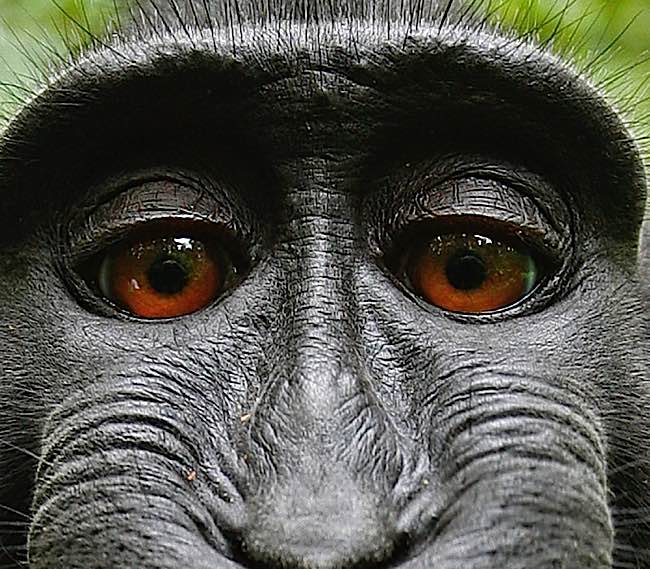
The Buddha’s first precept in Pali reads: “Panatipata verami sikkhapadam samadiyami” which translates more-or-less as: “I undertake the training rule to abstain from taking life.” For many, this meant human life. For others, particularly Zen Buddhists, it meant any breathing creature.
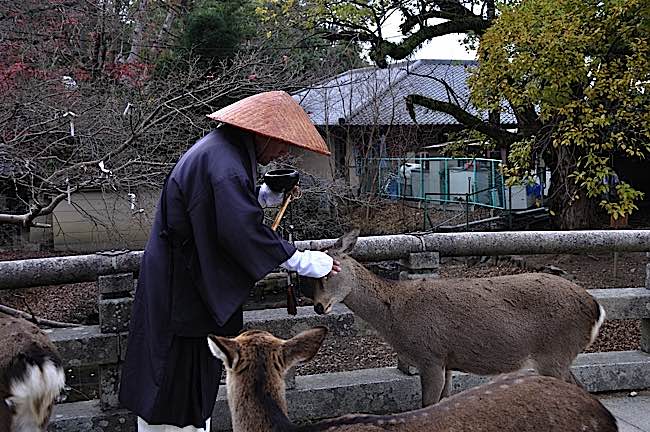
Cambridge Declaration: “Human’s not unique in possessing … consciousness.”
“Convergent evidence indicates that non-human animals have the neuroanatomical, neurochemical, and neurophysiological substrates of conscious states along with the capacity to exhibit intentional behaviors. Consequently, the weight of evidence indicates that humans are not unique in possessing the neurological substrates that generate consciousness. Nonhuman animals, including all mammals and birds, and many other creatures, including octopuses, also possess these neurological substrates.” — The Cambridge Declaration on Consciousness (See full text of official declaration at bottom of this feature.)
The scientists demonstrated that emotions and decision-making develop in all life forms down to cephalopod mollusks. Even Steven Hawking and other giants endorsed the declaration, titled “The Cambridge Declaration on Consciousness.” Issued by a prominent group of neurophysiologists, neuroanatomists, cognitive neuroscientists, neuropharmacologists and computational neuroscientists — this statement leaves little wiggle room for diminishing levels of compassion for “lower” life forms. [To read the full declaration, the PDF is available for download here>>] (View the video from Stephen Hawking on the sentience of lower animals, embedded below)
Stephen Hawking and Non-Human Consciousness
On the heels of this declaration, an orangutan in an Argentinian zoo won non-human personhood rights in a fight to determine if it had been unlawfully deprived of it’s freedom. Also, the credit for the “selfie” at the top of our feature is under legal review to determine whether the monkey or the owner of the camera deserved the credit. [7]
In another related story, Professor Marc Bekoff wrote in Psychology Today: “We know, for example, that mice, rats, and chickens display empathy…” Which brings us to chickens and the Dalai Lama.
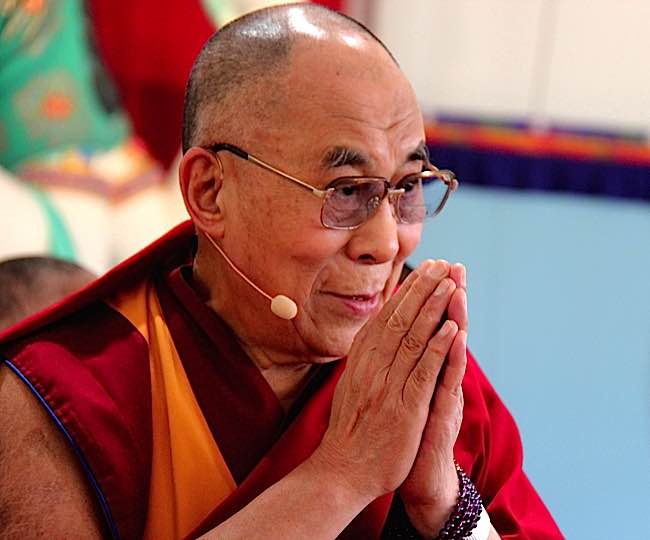
Dalai Lama’s “Cruelty to Chickens” Letter
In 2012, Buddha Weekly reported on the Dalai Lama’s protest letter, in which he wrote to KFC: “I have been particularly concerned with the suffering of chickens for many years.” At the time KFC slaughtered 850 million chickens each year (as of 2010). The Dalai Lama wrote to KFC, asking them to abandon their plan to open restaurants in Tibet “because your corporation’s support for cruelty and mass slaughter.” [1]
At the time, PETA proclaimed that chickens “feel pain and have distinct personalities and intelligence,” which was largely scoffed at publically. This later finding of the scientists at Cambridge University would seem to support both PETA and the rationale for the Dalai Lama’s protest.
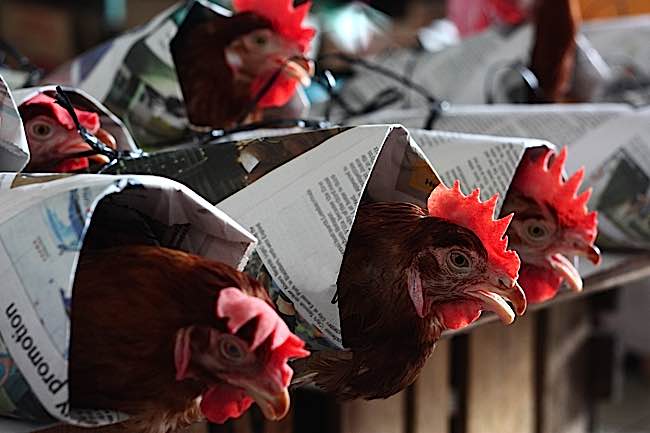
Killing is prohibited in Buddhism — clearly one of the main precepts — but often this is simply interpreted to mean “human” killing — on the basis that lower animals are not sentient. Even if killing of “lower animals” is necessary for survival, the doctrine of Metta prohibits Buddhists from causing suffering.
The Dalai Lama explained how he had become a vegetarian after witnessing the slaughter of a chicken. ” It was the death of a chicken that finally strengthened my resolve to become vegetarian. In 1965, I was staying at the Government Guest House in south India. My room looked directly on to the kitchens opposite. One day I chanced to see the slaughter of a chicken, which made me decide to become a vegetarian.”
He also explained why he particularly focused on chickens. “Tibetans are not, as a rule, vegetarians, because in Tibet vegetables are scarce and meat forms a large part of the staple diet. However, it is considered more ethical to eat the meat of larger animals such as yaks, than small ones, because fewer animals would have to be killed.”
Even the Buddha was not a strict vegetarian. He ate what his sponsors provided in his bowl, including meat. It was, according to tradition, tainted meat that led to his death and paranirvana.
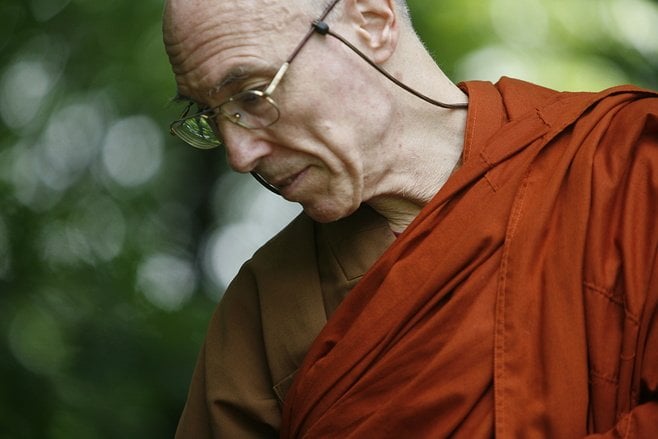
Bikkhu Bodhi: Sentient Being — “Any Being with Breath”
Theravadan Pali Canon tends to support the notion of all life as sentient. The well-known teacher Bikkhu Bodhi explains “pana” (from the First Precept in Pali ‘”pana” means “breathing, or any living being that has breath and consciousness.”) The Venerable teacher explains that this includes all animal life, including insects, but not plant life. The word “anipata” means to “strike down, and includes both killing and injuring or torturing. [8] Clearly, it is critical to avoid taking the life of “any being with breath.”
A key element in motivation. Accidentally stepping on an insect or running over an animal on the road would not generally be in conflict with the First Precept.

Zasep Tulku Rinpoche: “We must not hurt other people and animals.”
Venerable Zasep Rinpoche, spiritual director of Gaden for the West and Gaden Choling, emphasizes “right livelihood” to his students. He is unequivocal in his advice on the equal weight of importance between humans and non-humans. Rinpoche wrote in his Guidelines: “Right livelihood is one of the aspects of the eightfold noble path; it is an important Buddhist principle that we as Dharma practitioners practise right livelihood. We must not hurt other people and animals, and we must make the best use of the earth’s resources, in ways that do not do social and environmental damage.”
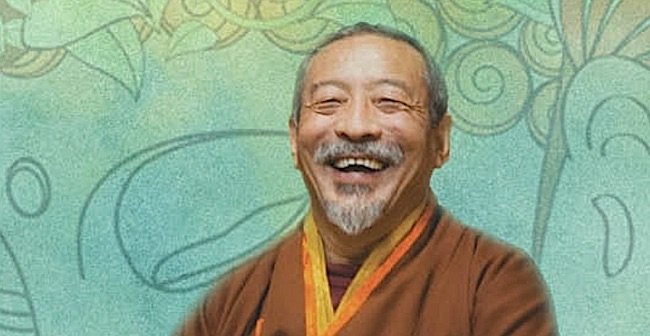
Karma Lekshe Tsomo: “Examine … Motivation”
Karma Tsomo, a professor of theology and a Tibetan nun said: “When making moral choices, individuals are advised to examine their motivation–whether aversion, attachment, ignorance, wisdom, or compassion–and to weigh the consequences of their actions in light of the Buddha’s teachings.” [8]
The same criterion would be important in issues of “self defense” including defense of one’s country in a time of war. According to Barbara O’Brien, “some 3,000 Buddhists” serve “in the U.S. armed forces, including some Buddhist chaplains. Buddhism does not demand pacificism.” Again, however motivation is key, in this case the “motivation” of the country sponsoring the soldier. Is the action that led to killing due to the negative motivation of the country, such as greed, attachment, hatred or ignorance? [8]
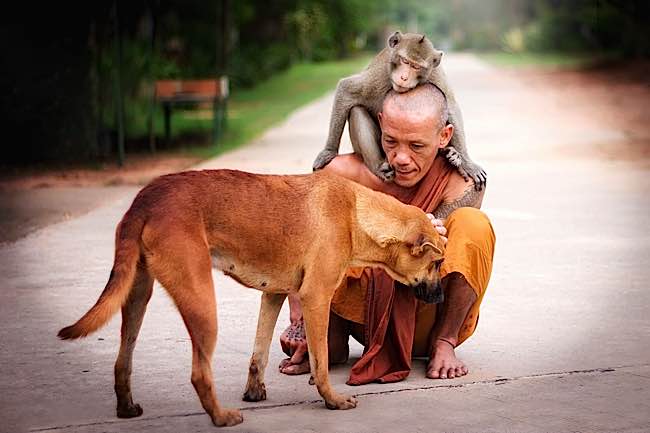
Thich Nhat Hanh: “No Killing Can be Justified”
The famous Zen monk and pacifist, who was once nominated for a Nobel Peace Prize is unequivicol in his view of the first precept against killing: “We cannot support any act of killing; no killing can be justified. But not to kill is not enough. We must also learn ways to prevent others from killing. We cannot say, “I am not responsible. They did it. My hands are clean.” If you were in Germany during the time of the Nazis, you could not say, “They did it. I did not.” If, during the Gulf War, you did not say or do anything to try to stop the killing, you were not practicing this precept. Even if what you said or did failed to stop the war, what is important is that you tried, using your insight and compassion.” [9]
Not only is the venerable teacher a well-known pacifist activist, he is also vegetarian. “Even if we take pride in being vegetarian, for example, we have to acknowledge that the water in which we boil our vegetables contains many tiny microorganisms. We cannot be completely nonviolent, but by being vegetarian, we are going in the direction of nonviolence. If we want to head north, we can use the North Star to guide us, but it is impossible to arrive at the North Star. Our effort is only to proceed in that direction.”
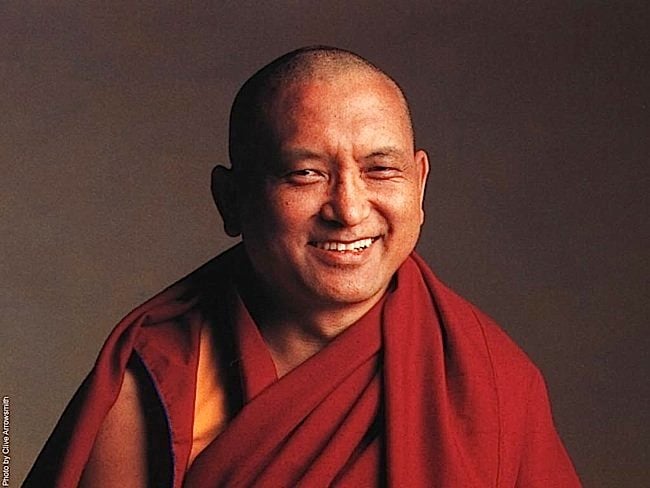
Lama Zopa Rinpoche: “Animals Experience Unbelievable Suffering”
The most Venerable Vajrayana teacher Lama Zopa Rinpoche replied to a student on the subject of vegetarianism: ” As there are more and more people becoming vegetarian, that means less and less animals will be killed. So it is very important. In the world people eat meat mainly because of habit; so many people have not thought that the animals experience unbelievable suffering.” [4]
He later described how he saw a cow struggling to not go down a ramp to slaughter: ” A man was pulling him down from the platform, but the cow didn’t want to go down. So I thought, I can’t stop the animal suffering, but what I can do as I go around the world to teach, even if it is on sutra and tantra, I will announce or request if people can become vegetarian. That is something I can do.”

Bodhisattva Vow: “Liberate All Sentient Beings”
In Mahayana Buddhism, often the definition of “sentient beings” is any being who is capable of experiencing Dukkha (suffering.) According to the Cambridge scientists, this is all beings down to and including octopuses.
In sutra, sentient beings are described as all inhabitants of the three realms of samsara within the six classes of beings. Included in the six classes are animals, fish, insects — any creature with mind. Particularly as relates to the Tathagatagarbha doctrine, all these creatures have inherent Buddha Nature, “the intrinsic potential to transcend the conditions of Samsara and attain Enlightenment.” [3]
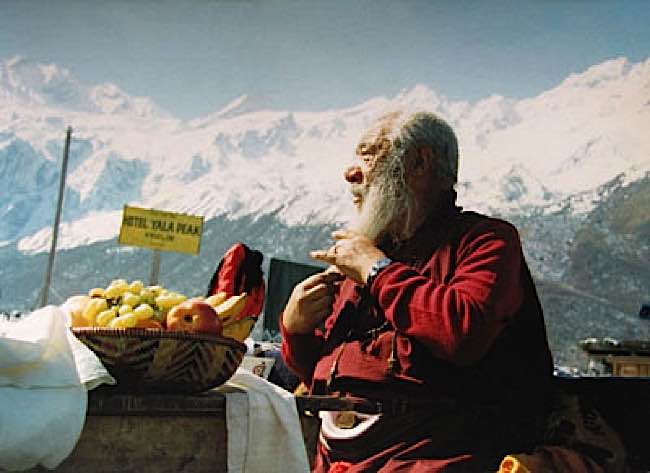
Kyabje Chatral Sangye Dorje Rinpoche: “Meat, the sinful food.”
The great Kyabje Chatral Sangye Dorje Rinpoche, a highly realized Dzogchen yogi, was a vocal opponent of meat for all of his long life, from 1913-2015. “If you take meat, it goes against the vows one takes in seeking refuge in the Buddha Dharma and Sangha. Because when you take meat you have to take a being’s life.”
In Chapter 2 of “Compassionate Action” he wrote: Meat, the sinful food, is not permitted according to the three vows: the vows of individual liberation, the Bodhisattva vows and the tantric vows.” [6]
On the other hand, many Buddhists are not vegetarians. Buddha Himself taught monks to eat whatever was placed in their bowl, including meat, unless they knew the animal was slaughtered for the monks. (See “First Precept: Killing versus Eating below).
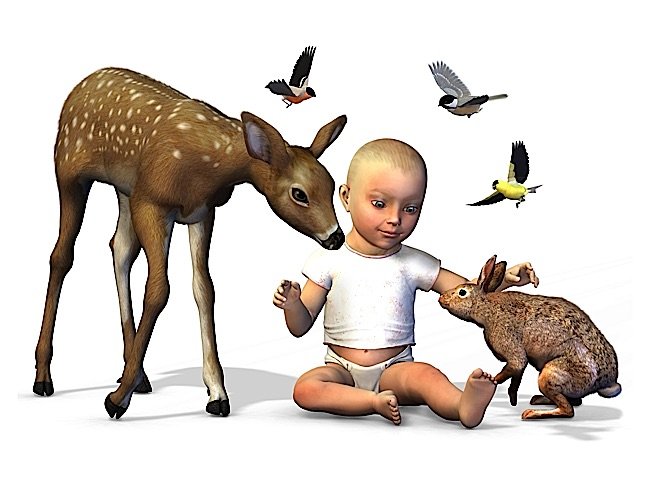
Buddha Taught Loving Kindness — but Not Just for Humans?
Without question, practicing Buddhists practice compassion and loving kindness — metta — for sentient beings. The doctrine of “karuna” or “active sympathy” and willingness “to bear the pain of others” is not debatable — at least not in Mahayana schools. Even if we interpret “compassion” to be a skillful method used by the Buddha to demonstrate the mistaken idea of “independent me” and “independent you” — there can be no doubt that kindness for sentient beings is not optional.
There is no question that the Buddha taught loving-kindness for all sentient beings not just humans. Why is this critical? Because Buddha also taught the doctrine of rebirth — that we can be reborn as insects, lower animals, and other forms of life. Compassion for all beings, down to crawling insects, is not implicit, it appears to be explicitly recommended. This does not mean Buddhists must be vegetarians, but at least that we must feel sympathy for the suffering of all creatures.
How Equally Do We Practice Compassion?
These findings of neuroscientists, when positioned against the Buddhist Dharma, beg the question: how equally do we practice compassion? We might feel more compassion, for example, for our beloved canine or feline. We might feel “sorry” for the beautiful deer lying by the side of the road, struck by a car. We might, like the Dalai Lama, feel sorry for the chicken, especially if we see a picture of a beautiful new-born chick. Do we then feel similar levels of sympathy for the insects splattered on our windshield, or the “less attractive” creatures such as spiders and venomous snakes?
Whether we accept the notion that we might be reborn as a future splattered insect, there can be no doubt that we are taught that our mission is to “free all sentient beings from Samsara.” How much worse is it when we, ourselves, create the causes of suffering?
First Precept: Killing versus Eating? They’re Different Right?
The first precept Buddha taught was not to kill. However, certainly in Pali cannon, this is usually not interpreted to prohibit the eating of meat — only the killing of the animal or the sponsoring of the killing. Mahayana sutras, tend to strongly advocate vegetarianism, particularly the Lankavatara Sutra. [2] In the Jivaka Sutta, Buddha probited the monks from consumption of the flesh of any animal that was seen or suspected to have been killed for the benefit of the monks. Generally, monks were expected to accept and respect all alms provided in their bowls, including meat, without discrimination.
Clearly, this later became an issue when monks formed communities and monasteries, where it became more difficult to argue that the animal was not killed specifically for their benefit. As devout Buddhists, the argument, therefore, comes down to whether we believe the meat on the supermarket shelf was killed for our benefit. If we believe we are not encouraging the killing, or supporting cruelty, then it would not be considered a conflict with the first precept. If we believed that by buying the meat we are supporting the slaughter of animals, we would be in conflict. Ultimately, that’s a personal choice. While meat might be debatable, what is clearly not permitted, according to this precept, is the deliberate slaughter of a sentient being, including chickens.

Geshe Thubten Soepa: “Meat Not Allowed”
In a question and answer series about vegetarianism with Geshe Thubten Soepa, a FPMT-registered teacher, he answers: “In the Mahayana teachings the Buddha forbade eating meat altogether. In many different sutras (the Lankarawatara Sutra, the Great Sutra of Nirvana in the Angulimala Sutra, the Sutra on the Ability of the Elephant, the Sutra of the Great Cloud), it is taught that if one is trying to live with great compassion, then eating meat is not allowed. This is because one has to see all sentient beings as our mother, brother, son, etc. Also in the Angulimala Sutra, Manjushri asked the Buddha, ‘‘Why do you not eat meat?’’ He replied that he saw all beings as having buddha-nature and that was his reason for not eating meat. Therefore, if you practice Mahayana and eat meat, it is a contradiction.” [5]
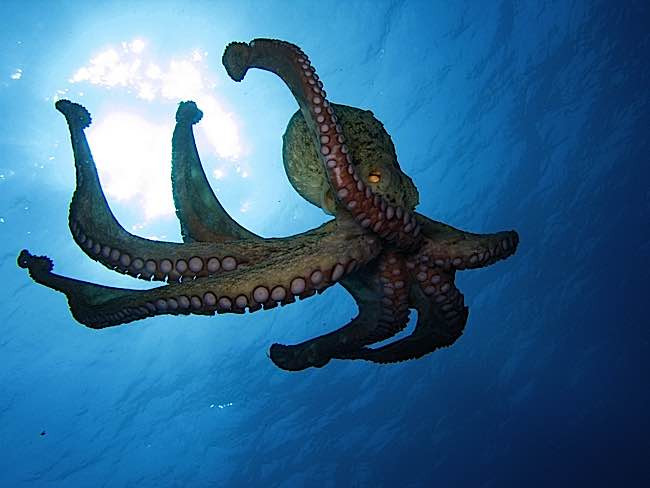
The Cambridge Declaration on Consciousness*
Here is the full text of the Declaration on Consciousness:
On this day of July 7, 2012, a prominent international group of cognitive neuroscientists, neuropharmacologists, neurophysiologists, neuroanatomists and computational neuroscientists gathered at The University of Cambridge to reassess the neurobiological substrates of conscious experience and related behaviors in human and non-human animals. While comparative research on this topic is naturally hampered by the inability of non-human animals, and often humans, to clearly and readily communicate about their internal states, the following observations can be stated unequivocally:
- The field of Consciousness research is rapidly evolving. Abundant new techniques and strategies for human and non-human animal research have been developed. Consequently, more data is becoming readily available, and this calls for a periodic reevaluation of previously held preconceptions in this field. Studies of non-human animals have shown that homologous brain circuits correlated with conscious experience and perception can be selectively facilitated and disrupted to assess whether they are in fact necessary for those experiences. Moreover, in humans, new non-invasive techniques are readily available to survey the correlates of consciousness.
- The neural substrates of emotions do not appear to be confined to cortical structures. In fact, subcortical neural networks aroused during affective states in humans are also critically important for generating emotional behaviors in animals. Artificial arousal of the same brain regions generates corresponding behavior and feeling states in both humans and non-human animals. Wherever in the brain one evokes instinctual emotional behaviors in non-human animals, many of the ensuing behaviors are consistent with experienced feeling states, including those internal states that are rewarding and punishing. Deep brain stimulation of these systems in humans can also generate similar affective states. Systems associated with affect are concentrated in subcortical regions where neural homologies abound. Young human and nonhuman animals without neocortices retain these brain-mind functions. Furthermore, neural circuits supporting behavioral/electrophysiological states of attentiveness, sleep and decision making appear to have arisen in evolution as early as the invertebrate radiation, being evident in insects and cephalopod mollusks (e.g., octopus).
- Birds appear to offer, in their behavior, neurophysiology, and neuroanatomy a striking case of parallel evolution of consciousness. Evidence of near human-like levels of consciousness has been most dramatically observed in African grey parrots. Mammalian and avian emotional networks and cognitive microcircuitries appear to be far more homologous than previously thought. Moreover, certain species of birds have been found to exhibit neural sleep patterns similar to those of mammals, including REM sleep and, as was demonstrated in zebra finches, neurophysiological patterns, previously thought to require a mammalian neocortex. Magpies in particular have been shown to exhibit striking similarities to humans, great apes, dolphins, and elephants in studies of mirror self-recognition.
- In humans, the effect of certain hallucinogens appears to be associated with a disruption in cortical feedforward and feedback processing. Pharmacological interventions in non-human animals with compounds known to affect conscious behavior in humans can lead to similar perturbations in behavior in non-human animals. In humans, there is evidence to suggest that awareness is correlated with cortical activity, which does not exclude possible contributions by subcortical or early cortical processing, as in visual awareness. Evidence that human and nonhuman animal emotional feelings arise from homologous subcortical brain networks provide compelling evidence for evolutionarily shared primal affective qualia.
We declare the following: “The absence of a neocortex does not appear to preclude an organism from experiencing affective states. Convergent evidence indicates that non-human animals have the neuroanatomical, neurochemical, and neurophysiological substrates of conscious states along with the capacity to exhibit intentional behaviors. Consequently, the weight of evidence indicates that humans are not unique in possessing the neurological substrates that generate consciousness. Nonhuman animals, including all mammals and birds, and many other creatures, including octopuses, also possess these neurological substrates.”
* The Cambridge Declaration on Consciousness was written by Philip Low and edited by Jaak Panksepp, Diana Reiss, David Edelman, Bruno Van Swinderen, Philip Low and Christof Koch. The Declaration was publicly proclaimed in Cambridge, UK, on July 7, 2012, at the Francis Crick Memorial Conference on Consciousness in Human and non-Human Animals, at Churchill College, University of Cambridge, by Low, Edelman and Koch. The Declaration was signed by the conference participants that very evening, in the presence of Stephen Hawking, in the Balfour Room at the Hotel du Vin in Cambridge, UK. The signing ceremony was memorialized by CBS 60 Minutes. [10]
NOTES
[1] “Cruelty to Chickens Protest: Dalai Lama“, Buddha Weekly
[2] “Buddhism and Vegetarianism“, UrbanDharma.org
[3] “Sentient Beings”
[4] “Inspired to Become a Vegetarian” Lama Zopa Rinpoche
[5] “Nine Questions About Vegetarianism” with Geshe Thubten Soepa, FPMT
[6] “Kyabje Chatral Sangye Dorje Rinpoche”
[7] “Orangutan in Argentina Wins Non Human Person Rights“, Raw Science
[8] “The First Buddhist Precept, To Abstain from Taking Life,” by Barbara O’Brien
[9] “The First Precept: Reverence for Life” by Thich Nhat Hanh
42 thoughts on “Prominent Scientists Declare “All Non Human Animals… Are Conscious Beings.” The Dalai Lama Protests Chicken Slaughter. An Orangutan Won Non-Human Rights Over Zoo Keeper. What Do the Teachers Say About Non-Human Compassion?”
Leave a Comment
More articles by this author
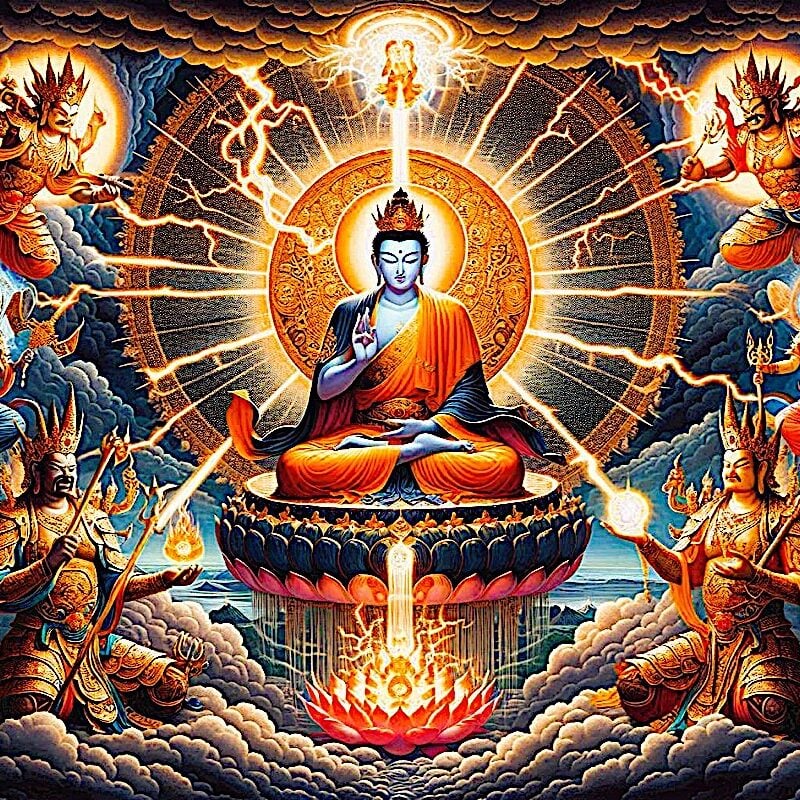
Protection from all Harm, Natural Disaster, Weather, Spirits, Evil, Ghosts, Demons, Obstacles: Golden Light Sutra: Chapter 14

Guru Rinpoche is ready to answer and grant wishes: “Repeat this prayer continuously” for the granting of wishes

VIDEO: Vajrapani Vajra Armor Mantra: Supreme Protection of Dorje Godrab Vajrakavaca from Padmasambhava
Search
Latest Features
Please support the "Spread the Dharma" mission as one of our heroic Dharma Supporting Members, or with a one-time donation.
Please Help Support the “Spread the Dharma” Mission!

Be a part of the noble mission as a supporting member or a patron, or a volunteer contributor of content.
The power of Dharma to help sentient beings, in part, lies in ensuring access to Buddha’s precious Dharma — the mission of Buddha Weekly. We can’t do it without you!
A non-profit association since 2007, Buddha Weekly published many feature articles, videos, and, podcasts. Please consider supporting the mission to preserve and “Spread the Dharma." Your support as either a patron or a supporting member helps defray the high costs of producing quality Dharma content. Thank you! Learn more here, or become one of our super karma heroes on Patreon.
Lee Kane
Author | Buddha Weekly
Lee Kane is the editor of Buddha Weekly, since 2007. His main focuses as a writer are mindfulness techniques, meditation, Dharma and Sutra commentaries, Buddhist practices, international perspectives and traditions, Vajrayana, Mahayana, Zen. He also covers various events.
Lee also contributes as a writer to various other online magazines and blogs.








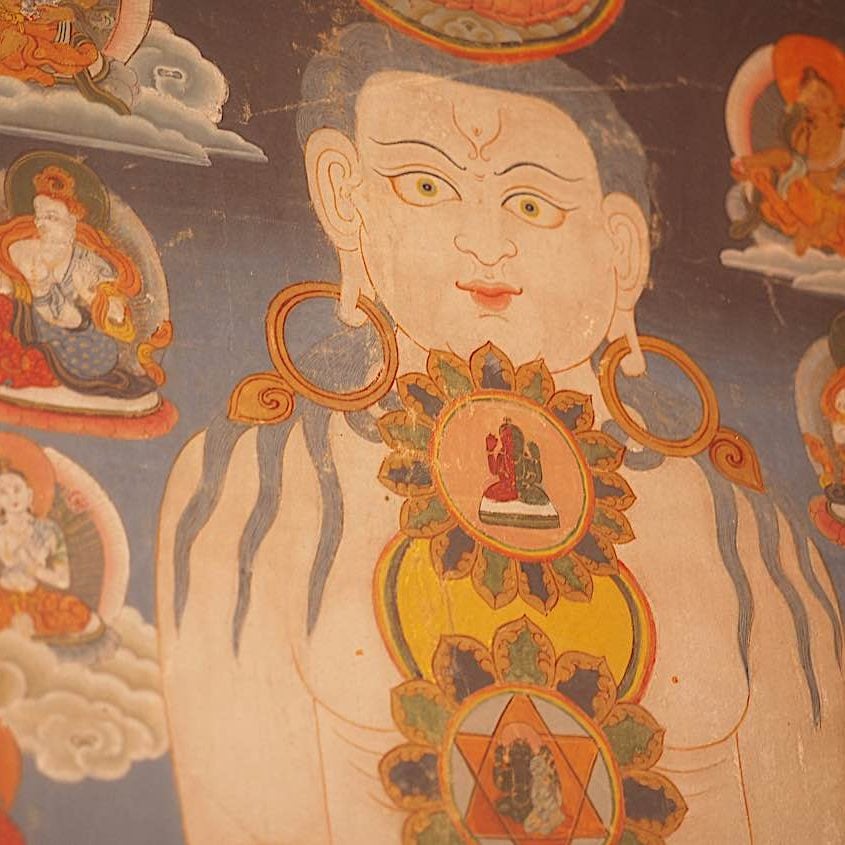

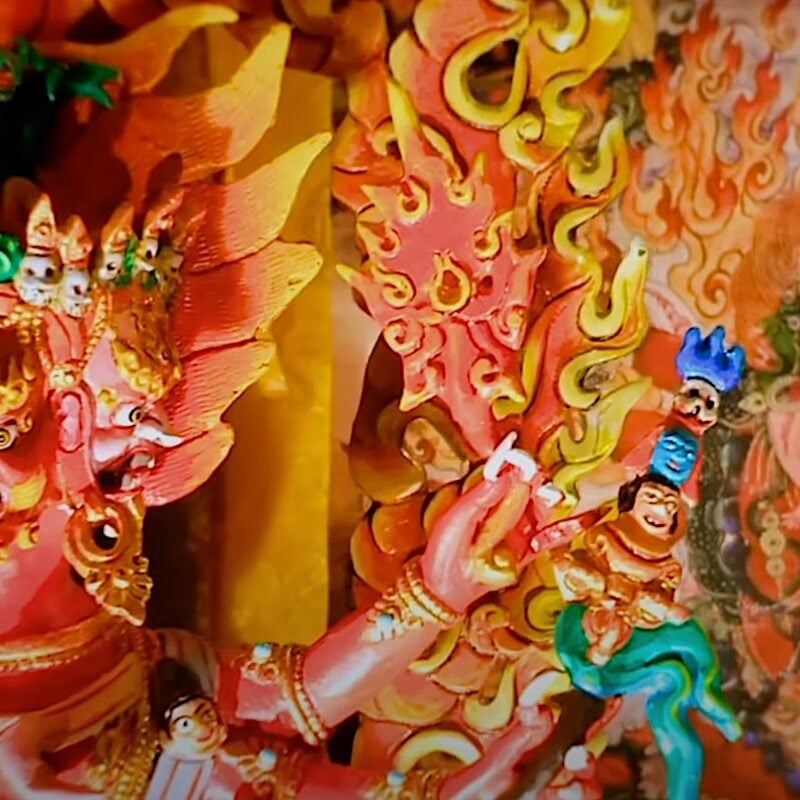


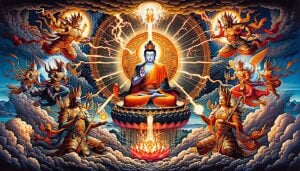


Sure it is inhumane to kill violently. All killing should be as painless or as quick as possible, but don’t you see what animals do to each other? Many are eaten slowly alive by other animals.
It is nature’s way. Are not humans part of nature?
Hi Neil. What in nature are you comparing us to? The lion? monkey? If you were thrown into nature you would probably eat 100% plants, berries, seeds, fruits, maybe bugs that you could catch. Would you run after a lion and sink your teeth into his flesh? Of course not. In any case our teeth are not design to tear apart flesh. We have to cook it, cut it to small pieces, flavor it, etc. But that’s not the point. We, humans differ from animals in that we have freedom to chose and the ability to know right from wrong (some animals do too). We can choose not to kill, murder, rape, exploit. If you choose to kill, rape, etc. Then you are a killer, rapist, etc. Period. So if you choose to kill animals or pay your butcher to do it for you, then you are still a killer. There is always a fight with our conscous because it’s hard to give up the meat habbit so we come up with every excuse possible, but at the end of the day, all animals as humans want to live and avoid suffering. No animal comes to the slaughter house by free will and gives up it’s life. He actually fights every step of the way to save it’s life, but they our powerless against our machines. If you choose to buy meat (please read: dead animal parts) you are killing. Killing is murder. No way around it.
Interesant ideas but, for exemple, a python cannot eat fruits, vegetables or cereals,
It will die for sure if it cannot find prey
Can we change the animals nature?
We’re living in a prison called Samsara. Our status here, in this existence is that we’re prisoners. That’s what even The Gospel Jesus said, we’re living in an inferior plan of existence and we have to find the to access other superior worlds like Dakinis one in order to liberate us. Our perception of viewing the world is completely distorsioned, dualistic, inferior(Plato’s Cave). We must realise the truth in order to liberate us.
No canivorous animal in its natural circumstances raises and treats it’s prey the way us human animals do.
Firstly they do not breed them for optimum productivity to the point of deformity and neither do they intentionally confine them in prisons so that they cannot express their instinctive behaviours.
They do slaughter one gender of animals at birth and call it wastage as in the production of eggs.
They do not rape another species to eat it’s babies.
They do not keep an animal continually in a state of artificial lactation to to steal it’s milk.
I really could go on about the completely unessesary useage of our fellow sentient beings but it really is up to you to investigate what truly happens to them if you are going to commit such a final and drastic life and death upon them.
I think a good way to phrase it is to note that animals in the wild kill for SURVIVAL. Today, humans don’t kill for survival. We abuse the lives of over 50 BILLION animals a year simply to make our car interiors look nice or because we think an animals flesh will enhance our pasta dish.
If you have to kill an animal to survive, I see no moral issue with that. But when you kill an animal simply for your pleasure, then this is perverted.
And humans, today, are not only killing BILLIONS of animals for mere pleasure, but also after the animals have been abused — and sometimes for years. It’s deeply, deeply grotesque.
You can simply choose the veggie burger instead of the beef burger. You can simply order the ravioli without the veal in it. It’s not hard!
Very well put
so lovely and inspiring!!
We mustn’t conclude that our own violence can be excused because it is “nature’s way”. Yes, we are a part of nature, but we don’t look to nonhuman animals for moral guidance. Of course it’s true that we cannot live without causing some harm to others, but before we confine and kill another breathing, sentient being, we owe it to them and to ourselves to determine whether it is truly necessary. A painless method of slaughter does not absolve us from our complicity in the needless confinement, deprivation, and suffering that we typically cause to others for little other reason than habit and the pleasures and comforts of satisfying an appetite.
.
Well put Don Robertson.
In referring to Thich Nhat Hanh the author wrote, “Not only was the venerable teacher a well-known pacifist activist, he was also vegetarian” Please note, Thich Nhat Hanh is very much alive and although he did suffer a stroke he is receiving medical care in California.
In addition, if one follows the path of non-killing as Buddhist precepts instruct, then one should aim to protect all lives, including non-human animals. I’m vegan for 1.5 years, eat well, have very good health and don’t worry about this ethical “dilemma”. Consider veganism, as vegetarianism still promotes animal cruelty.
Hi Michelle,
Sorry if this confused, the “was” as a tense wasn’t meant to imply the great teacher passed, only that this was his past-tense position. We can see how that could confuse, we’ll try a line edit on that. Thank you. In kindness, Derek
Immagine what happens to an animal thats getting killed. Immagine the same happens to you. Would you agree with the arguments for killing (you)? The ones who have the possibility to live vegetarian or vegan should not eat meat if they REALLY LOVE the world.
I share with you an article Mathieu Ricard has written on his blog (have you read his book “In defense of animals”?):
« Leonardo da Vinci wrote in his notebooks: ‟The time will come when people like me will think of the murder of an animal just as they think today of the murder of a man.” And George Bernard Shaw said, ‟Animals are my friends, and I don’t eat my friends.” It’s not a matter of denying that there are differences in intelligence between animals and human beings, and that relatively speaking a human life is worth more than the life of an animal. But why should the right to live be the prerogative of humans alone?
All living beings want happiness and try to avoid suffering. To assume the right to kill animals by the billion all the year round (10 billions of them are killed yearly just in the USA), therefore, is no more than the law of the jungle. Just a few centuries ago, the trade in ‟black gold,” slaves from black Africa, was considered acceptable. These days, there’s still slavery in India, Pakistan, the Sudan; children are sold to work in factories or in the fields, and young girls for prostitution. But elsewhere, generally speaking, slavery is seen as an abomination.
What do people do when they’re exploited or oppressed? They get organized, form trade unions, protest and rebel. Animals are incapable of any of those things, so they’re exterminated. This ought to be completely rethought. »
It is also generally believed that prey animals go into a state dof shock and are not aware of pain once that has happened. Thus they experience a few moments of fear before death. Suffering is minimised in most instances. This bears no resemblance to factory farms and mass slaughterhouses. Our lifestyle today has little resemblance to nature.
I sincerely wish that the word “vegetarian” was replaced with “veganism” in all of these reasonings.
I’m afraid to say that there is a lot of unawareness in the world of buhddism in regards to the equally horrific suffering caused by all animal usage, not just those raised for meat consumption.
Why don’t Buddhists write about the Dalai Lama’s inconsistency about this? He has said many times that he supports experiments on animals (even Richard Davidson’s fear and brain ablation experiments on young monkeys at the University of Wisconsin). He also eats animals. But I’ve not seen much written by Buddhists about his behavior and contradictory remarks. His position seems to have reinforced a similar position in other Tibetan Buddhists leaders as well.
Hi Rick,
Not sure what you have for links to evidence of the Dalai Lama’s support of animal experiments, but I personally don’t agree, and the evidence in the news is to the contrary. (To single out a person, without any support is pretty much not cool) If you search it on Google, it’s pretty clear his official position is agains. See here from PETA (and he supports PETA, by the way)>> He has frequently also spoken out publicly that a Vegan lifestyle is preferred except for health issues. He, himself, had a health issue and his doctor recommended small amounts of meat, and also it’s clear from this interview that he eats NO MEAT at home, but only when hosts offer him meat while travelling (it’s considered inappropriate for a monk to refuse anything given, including meat). FROM A TORONTO STAR ARTICLE: “His compromise is to eat vegetarian in Dharamsala and meat dishes when he’s on the road and it’s offered by his hosts.”
In Buddhist doctrine, Buddha forbade KILLING not specifically meat, and in Tibet where it is very difficult to grow vegetables (only Barley grows in a lot of areas), they grew up eating some meat and butter, but always with respect — but for Buddhist monks they ate what was given them (DANA) and that could include meat.
The meat-eating prohibition is more a Zen and broader Mahayana rule, it’s not really overall applied to Buddhists, but killing is prohibited, and some Buddhists cannot in conscience eat meat because buying meat creates demand which leads to killing. Other Buddhists follow the strict words of Buddha, prohibiting killing, but allowing meat when given.
There is no contradiction here, and Buddhists are amongst the most likely to be vegetarian overall, and the most likely to consciously avoid killing, even insects.
Hi Derek,
Sadly, there is ample evidence to support my observations. Here is one of many examples. I read this article in the paper when it was originally printed. If you have access to a good newspaper archive, I imagine you’ll be able to locate it:
“Dalai Lama digs into veal, pheasant.” Nancy Stohs. Milwaukee Journal-Sentinel. 5/15/2007.
It’s a question most chefs never get the privilege of pondering:
What to serve the Dalai Lama?
In Milwaukee chef Sandy D’Amato’s case, the answer was veal.
Veal?
Despite expectations that a vegetarian feast would be in order, the team of chefs assembled to cook for His Holiness on his recent visit to Madison was given no such instruction, said Catherine McKiernan, executive chef at the Madison Club, where the elaborate luncheon was held.
The Dalai Lama is, it turns out, a meat lover.
And so the five-course menu, served to about 60 people on May 3, including the guest of honor, his entourage and assorted citizens, included a stuffed pheasant breast, D’Amato’s slow-cooked veal roast with scalded morels and escarole, and an asparagus soup with a chicken stock base.
A cured fish appetizer, mixed green salad, eggplant-and-chickpea entrée, and three full-size chocolate desserts completed the menu. …
—-
When it comes to his support of animal experimentation, I was present on one occasion when he explained his position; local activists had been able to more or less stack the deck of questions from the audience and he was asked about the experiments on monkeys at UW-Madison (where he was speaking.)
Years ago, I learned of his support for brain research on animals when he spoke at a science conference and was asked about it. He was quite clear. I believe that was his first public statement about his support.
No matter what you might read, the evidence is clear. Richard Davidson, one of his personal friends, always calls attention to the Dalai Lama’s support for the experiments on fear using young monkeys at UW-Madison whenever Davidson is asked about it in public and is quick to show pictures of himself with the Dali Lama.
I met personally a few years ago with the Lama who leads Deer Park, a Tibetan temple and community near here. He was adamant that the scientists using the animals know best.
Sadly, since both Buddhism and our treatment of animals are things I have practiced, studied, and written about, I have gathered a significant body of data on this topic.You can indeed find statements from the Dalai Lama that seem to indicate that he cares about animals, but it is my impression that his values and moral positions shift with the tides.
I think this issue deserves more attention from the Buddhist community.
Thanks Rick, we appreciate the references, that makes it a great discussion. Much respect to you for researching it.
As a Buddhist and a Vegan, who is passionate about animal rights, I’d be saddened to find out any Buddhist leader was not Vegan. Saddened, but not devastated, because many of my close friends (who are Buddhists) eat meat. I have to respect their choice, but that doesn’t stop me from arguing for animal compassion and veganism. In other words, I don’t think this story should be about one person, even the Dalai Lama. I also agree the issue deserves more attention from Buddhist community, but by that I mean the issue of animal compassion and rights.
As Buddhists we undertake to free all sentient beings from suffering — and science agrees “sentient” includes animals.
Of course, the Dalai Lama is an important person in Buddhism, and it’s unfortunate that prominent people (in any area, politics, sports, religion) often are held up for public examination and as an example. Since we’re finding published media stories both ways, it deserves, as compassionate critics (in my opinion) some benefit of the doubt… there’s some doubt as to the real facts. I did another Google search on it — it goes both ways.
This story, though it quotes the Dalai Lama and several other teachers and scientists, is about the Cambridge Declaration (from scientists), first and foremost, and then animal rights from a Buddhist perspective. While the Dalai Lama is a well-known Buddhist teacher, this story wasn’t about him. We also mention other Buddhist leaders who are very strict vegans, like the great Thich Nhat Han.
I debate not in the spirit of confrontation, but just in the tradition of friendly discussion. To me, regardless of the Dalai Lama’s position on these things, the story is bigger than one person.Even if we wanted to nevertheless discuss the Dalai Lama, I think it’s important to accept at face value his statement to the Toronto Star that he only eats meat when he’s a guest and offered meat. Tibetans take guest obligations fairly seriously. Monks, as well. Most monasteries will take any food donated. I believe (but I’m not an expert) it’s bad karma to refuse. In any case it wouldn’t be polite. I think the more so for world leaders and religious leaders.
Anyway, thanks for debating.
I appreciate your thoughts Derek. I don’t think polite behavior can account for his dietary choices and certainly it doesn’t account for his support of invasive brain experiments on young monkeys. Maybe I’m particularly sensitive to this because he is a regular visitor to Madison and is frequently showcased by the university. His presence is used to bolster their public image. I notice too that Davidson is featured on this website; he argues that the Dalai Lama supports his involvement in those invasive experiments. Such mixed messages confuse the general public and make efforts on behalf of animals much more difficult.
Again, thanks Rick. Absolutely — invasive brain experimentation on monkeys or even mice is completely unethical, wrong, wrong, wrong. No disagreement. I’m just not sure if the link has been made firmly to the Dalai Lama, i.e. he’s aware of invasive brain experiments. Even if he knows Davidson’s research, does he know about the monkey research? Do we know that? Do we even know it’s the same Davidson. Say it’s a fact that it’s the same Davidson and this Davidson did this kind of research. (HYPOTHETICALLY). Now, if Davidson says the Dalai Lama supports his research, maybe that’s true (that sounds like Davidson’s words, not DLs). Dalai Lama has a keen interest in science. Even so, is there an indication the Dalai Lama knew that the research involved invasive brain experiments or is it just guilt by association?(Again, hypothetical, taking you at your word that Davidson does this research).
You mention that we covered him. We have a story about Compassion, where a Richard Davidson uses video MRI with monks (not animals) to study cognitive responses — this was newsworthy, but there’s not mention in the documentation or background about animal experimentation. I can’t imagine any ethical Buddhist supporting such a thing. If, for example (hypothetically again), a deeper backgrounder found that that very Davidson conducted invasive brain research on monkeys, that would, by association seem to indicate the writer was supporting Davidson’s invasive research — clearly that’s not the case. He didn’t know about it. Davidson was really a small part of that story– supporting an underlying hypothesis. Now, I just did a quick internet search, and did find some mentions of Davidson and monkeys (just now), but the internet being the internet, I’ll have to delve further to see if it’s credible. If it is, we’ll no doubt alter the story, or remove it. But, the point is, not knowing is not the same as supporting.
So I’m just asking the question? Could it be that the Dalai Lama knows Davidson (if this is the same guy), respects his MRI and brain research, but has no idea about invasive animal procedures? It’s not exactly public knowledge. Davidson saying Dalai supports his research doesn’t mean Dalai Lama supports invasive methods. Just wondering. I would be the first to say that I would never support any person who undertakes animal research — no matter who that person is.
I’d Like to understand why people advocating veganism are so aggressive against vegetarianism. I find that veganism as an ideology is not only unrespectful of other choices, but also highly contradictory. The vegan discourse is always focused on the cruelty of braising animals in contemporary world, ok, but what is the position towards sustainable or ancient braising practices, which can be regarded more like a cooperation between human and animals (I.e. Pigs braised in the woods, sheeps, goats and horses left wild, living their life fully) . Most pets and domesticated animals can not survive alone in the wild, shall we just abandon them to death because of an ideology? In addition, shall vegans refuse to wear wool clothes or are they allowed in the ideology? How about silk? That can be seen as silk bugs enslavement. So shall we refuse all this forms of non-killing cooperation with animals and wear only synthetic clothes, which in turns increase our dependence on fossils and oil, increasing pollution and environment destruction, which in turn harms ecosystems therefore harms all living beings? Can’t you see the contradictions here? I invite people and specifically vegan to revise whether their choices are fully pondered and if they are the result of compassion or just hatred towards different way of thinking or behaving, because sometimes it looks exactly like that, a new ideology, a doctrine with lost roots in compassion and clear understanding
I appreciate your sentiment. When things become ideologies or extreme positions they become political. Buddha taught the middle way, which — even if someone is not a Buddhist — is a practical, sane, peaceful approach to life. No extreme is good, period. Nor, is abrupt change. I believe veganism is noble, but so is vegetarianism. At least a vegetarian is engaging compassion with a will. Yes, it’s true, no approach, even veganism, can eliminate the suffering of animals we’ve become dependent on. But, that shouldn’t stop us from taking moderate, compassionate, realistic approaches to compassion for our animal brothers and sisters. Every bit helps. In the same way, every plastic bottle recycled matters in the fight for a greener world, so, too, does every animal saved from unnecessary suffering.
In Hong Kong, they embraced a wonderful movement called Green Mondays. By some estimates, 25% of the population celebrate it. It’s not about green recycling. It’s a Vegetarian Day. Hong Kong, so dependent on meat, embraced this one day a week where they would reduce their dependence on animals. The reduction is significant. So every “day off” from meat eating counts. Every vegetarian counts in a big way, in the fight to reduce animal suffering. And even meat eaters who simply reduce consumption, they are contributing to the fight as well. It all matters, since we’re currently slaughtering 56 BILLION farmed animals each year in the U.S. ALONE. 3,000 per second. They estimate each person who eats meat is directly responsible for the lives of 95 slaughtered animals every year (see “Vegetarianism global priority“). Not to mention the simple fact that meat agriculture is one of the heaviest polluters on the planet.
What doesn’t work, never has worked, is any extreme movement. Extremism becomes faddish, which doesn’t last. If being a dairy-consuming vegetarian means staying vegetarian (as opposed to returning to old habits of meat eating), then that’s a victory.
I wish Green Monday would spread as a viral movement around the world. That one day respite from slaughter would make a huge difference to the sustainability of our fragile planet.
And, I agree with you, Vegetarians are doing their part with as much will and compassion as Vegans.
Thanks For the kind words, derek
I’m responding to both Francesco and Derek: I am an extremist on some issues, and I’ll wager that you are too. There are ethical/moral issues that do not have a defensible middle ground. A small amount of child sex slavery is better than lots of child sex slavery, but it would be odious to me to learn that someone was being congratulated or thought to be part of the solution simply because they cut back on their use of child sex slaves or limited the sort of things they were doing to them. I don’t believe there is a moral/ethically correct position on this issue other than the extreme view that no amount of child sex slavery is acceptable. There is no middle way on child sex slavery.
Likewise with numerous other issues. There are things that are so wrong, that even a little bit is completely wrong.
Hurting and/or killing others because their flesh or secretions have a pleasant flavor or have some utility, or their fur can keep us warm, or we might learn something by conducting harmful experiments on them, all seem to me to be elements of the set of moral issues that have no middle ground.
Hi Rick,
No argument here (on a personal level). Especially on something like child sex slavery, there’s no middle ground on that (it’s criminal, heinous and not defensible). Or any clearly criminal act, period. No middle ground.
But realistically, on issues that have defensible sides — and I’m sure meat eaters will say they have one (I don’t personally agree) — then the middle way is more skillful. I think it’s better to convince people to give up harmful habits in whatever skillful way we can. If we force people, it never ends well. If every single meat-eating person cut back on meat consumption 10%, in America alone we save nearly 6,000,000,000 animals from slaughter — in U.S. alone. If we further convince another 10% to become vegetarians, another 6 Billion. If we started a movement for meat-free Mondays, and only 25% adopt it seriously, that’s another 1 billion (give or take).
Movements take time. Revolutions don’t take as much time, but they often don’t end well. And, in the battle for rights — in our argument that animal rights matter — the people who don’t agree will argue you can’t take away their right of choice. Appealing to compassion and the heart is usually the best way, at least that’s my belief.
We’ll never win all hearts and minds, but compassion may be enough to win these small but meaningful gains.
Hi Derek, I get your sentiment, but I don’t think history supports your view as far as the set of no-middle-ground issues are concerned. Also, on those issues, I don’t think polite discourse (urging and applauding small gains) is wise because it undermines, maybe even denies the seriousness of the problem being discussed. Polite discourse about Jews being turned into soap would not, to me, have been appropriate. The time one might have taken, the arguments needed, the compromises required, would, it seems to me, have been wholly counterproductive and perhaps immoral. Strong language and action was needed. Two books that I recommend that address the issue of appropriate effort regarding the set of no-middle-ground issues — neither have to do with animal use — are John Brown, Abolitionist: The Man Who Killed Slavery, Sparked the Civil War, and Seeded Civil Rights (2006) by David S. Reynolds; and, “A Problem from Hell”: America and the Age of Genocide (2013) by Samantha Power.
As an aside, since this is a website focused on Buddhism, I believe the middle way was mostly an assertion that the extreme deprivations by the sadhus were unnecessary, but that no effort at all would not be sufficient. Applying the tenet in all situations is, I think, contextually inappropriate.
Hi Rick,
I’ll stand by my middle ground for all things except the extremes you’ve mentioned. I would not advocate slow and steady, convince and educate, and softer approaches for slavery, animal testing, genocide, torture, child sex, or anything so obvious wrong only monsters disagree. The context here is animal sentience, and how it is wrong to allow animals to suffer, and Francesco’s context– although I can’t speak for her — seems to be vegetarianism vs veganism.. Meat eating isn’t black and white as genocide. It’s definitely wrong, but the people who are contributing to the meat industry wrongs are not monsters. They are our friends and family, who, hopefully, over time, we can convince to take a more humane path, and who are misguided by the culture they were brought up in.
So, in this case, I think what’s contextually inappropriate is more the extreme examples of genocide, etc. It’s a little extreme.
Hi Derek, opinions will vary of course, but things like slavery and genocide have been the results of generations of acceptance. Very few people think of themselves as monsters. Things that seem like monstrous behavior to me are condoned in other cultures — think of the Hindu mass animal sacrifices or the dog meat trade in parts of east Asia. From the perspective of the members of those cultures, those things aren’t wrong. Perhaps they too would take exception to me comparing what they are doing with some behavior by others that they find heinous. But seeing the world from the animals’ perspective makes it all pretty clear. Holocaust survivor Isaac Bashevis Singer said that when it comes to the treatment of animals all men are Nazis. He could not say that today though, because more people understand that it is a Holocaust and are speaking out about it. I am hard pressed to find comparisons between the harmful use of animals today and all the terrible things we do and have done to other humans that could be deemed even a little extreme.
Hi Rick,
I think we agree in more ways than we disagree. But there always have to be degrees of action. Extreme solutions are suitable to extreme situations. We agree animals need protection, that animals are sentient, that they are our brothers and sisters (at least I assume we do). I just prefer to convince rather than cajole. Anyway, as always a great debate, thank you.
Cajole: “to persuade someone to do something by sustained coaxing or flattery.” Funny.
Poor choice of words. Of course I meant to use forceful, radical means. Forcing people to meet our view, isn’t useful. I’ll modify, then, “cajoling or convincing” is the best approach except where the situation is criminal, dire or horrendous. Yes, we could argue meat eating is horrendous, but the majority of the world doesn’t see it that way. As for animal testing, I believe a more forceful approach to awareness is appropriate. Scientists will often cite “greater good” and will not likely ever be convinced. However, if law makers can be convinced or cajoled, then scientists must comply. There is no such path for the cause of “convincing” meat eaters. It’s not something that can/will be legislated or forced, period, end of story.
Hi Rick,
I should have added, by the way, I agree there’s no middle ground on invasive (or even non invasive) animal testing. It’s wrong. No middle ground. I was referring to vegetarianism in my earlier response.
Being extrême like you say, means having no compassion. Cooperating with animals cutting their wool offering shelter and protection seem to me a vert sustainable practice. Just like picking a little bit of honey from a bee nest or using horses for transportation. I met people who are meat lovers and they are full of compassion and people like you who talk about ideology and have in real life no compassion. Delicate issues need delicate tools to be dealt with. You can’t do surgery with an axe, you need a scalpel but you want to use an axe
Hi Francesco. Here’s a link to a letter I wrote about 15 years ago regarding honey: https://www.all-creatures.org/aro/nl-20010613-hon.html
I think you may not have a clear picture of how animals are commonly treated. Maybe if you watched a video of sheep “cooperating” with the people shearing them, you would choose a different term. Here’s a video made by people working in the industry: https://www.youtube.com/watch?v=t0KHhdYVcIo
I’ve been around a number of horses, a few of which I’ve counted as personal friends. It’s very clear to me that until forced to do so, horses don’t want to be ridden, let alone have a bit in their mouth or a saddle on their back.
It’s odd to me that without knowing me, you have decided that I have no real compassion. I wish I were as certain as you are about things I don’t know about. You’re lucky, it must make your life quite pleasant.
Decades of firsthand experience, research about animals’ minds, the way they are treated, and trying to do something about it have resulted in something other than a pleasant time for me. Thanks for your comments.
Hi rick.
Thanks For sharing your letter and the video. I read and watched them.
It seems that you felt judged by my comments, but I just judged the way you expressed yourself.
At the same time, How do you think People would feel after being compared, as you did, to children sex slavers and nazi killers? Do you think this is a compassionate and fruitful way to convince people to go vegan? Me and many other people would just be offended and think we don’t want to become part of a community of haters who judge the vegetarians and others as slaver, pedophiles and nazi Jewish killers. You should really reconsider the examples you provide and the wording you do if you wish to get more people close to veganism. Or maybe you don’t want to do so, you are happy to be among those few ones who aknowledge the truth and are not harming animals in any way. I don’t know, I am just supposing. What I know is that you just reacted in an extremist way, confirming my feelings towards vegan people. You did not argue about the issues and the questions I posed. You carefully avoided the debated contradictions in vegan discourse I mentioned. You just reacted comparing everybody who is not vegan to a pedophile and a nazi. According to you, any population like the Tibetans, the Inuit, amazon Indians who survived eating meat and fish and dairy products, in a very balanced and sustainable way with their environment, should just consider themselves slaughterers. Maybe by talking and creating the context for a fruitful and compassionate dialogue, they may modify their diet, we could figure out more sustainable way to eat. But with your words I don’t think there is room for that. They are wrong. They are slaughterers, just like child slavers and nazi soldiers. Why they should change habits then? Only because Rick bodge said this to them? I think they may rather get offended and reinforce their beliefs, rather than accepting your view. We may have different opinion, the amount of violence we see in animal treatments can be unbearable for you or still acceptable for me. I never mentioned industrial treatment, cause I am strongly again animal factories practices so your video is not confuting what I said. Besides, I don’t see even in that unpleasant shearing competition, the same amount of violence as in ‘making soap with the Jews’ so no, definitely shearing sheep can not be compared to gas chambers or human crematories. As for the bees, I know that apiar practices can harm bees in some sort, but still, I believe it’s not comparable to bigger forms of cruelty. It can be seen as stealing harmfully, I know. But still not much as killing for leather or steaks. As dalai lama said, even in the vegetables you boil, you are killing thousands of organisms. Nobody is innocent for your parameters. Cruelty is present in nature. It is part of nature. How male bees are treated and condemned by their matriarcal society is cruel. You can not do anything about it. You can not eliminate cruelty and evil from reality. But I believe that, with compassion and understanding, we can choose to avoid the avoidable, choose to refuse to increase evil. Last, I still believe, from personal experience, a horse is much happier to be ridden but healed from a terrible colic, rather than be left dying in terrible pain. Love takes a lot of forms. Have a good day
Hi Francesco,
Your compassion and care is appreciated. I think this debate got a little heated because we crossed into different discussions. I can’t speak for Rick at all, but earlier Rick and I were debating extremism vis a vis invasive animal testing, particularly of monkeys. I think originally, I got a little heated because, although I feel the same way — that animal testing is abhorrent — I felt it went too far to label people as monsters via his examples (because the motivation of a modern scientist is not that of a monster). Anyway, somehow, this degree of analogy — the Nazis and slavery — which I think was more focused on animal testing, got mixed in with veganism and vegetarianism and meat-eating. I don’t think those examples would have come up in the context of meat-eating. It’s obviously over-the-top in that discussion. And, I agree, that instead of helping the cause, demonizing allies and friends (including meat-eating friends) is not a winning tactic at all.
I remain an advocate of the middle way (and yes, I’m using this term in it’s non-Buddhist sense). People are capable of being reasoned with, debate is constructive, and moderation is one of the keys to harmony and long term change. Many of my friends are meat eaters, and will remain so, even though we have lovely debates about it from time to time. I’ve only been vegetarian for 25 years or so.
And, with all due respect to Rick, and he’s clearly very knowledgeable, revolution and extremism have their place, but only in the case of extreme inhumanity. Animal testing is inhumane and horrendous enough for extreme sanction, but not the issue of meat eating. However, as you raised it, the issue of factory meat farming (when separated from the issue of dietary choice) is something that is due for a major shakeup. Eating meat is one thing, factory meat farming is approaching a level of inhumanity which deserves more extreme action — and as pointed out in this article, they are one of the worst polluters on the planet. Metta, Derek
namastéji
i’am a french woman tibetan buddhist i had found your blog on Google plus: such fantasticslessons Inside! i would like receive your newletter if that’s possible to red, learn, and share
my job: doctor without border
i had been catholic but for private reasons i had choisen to became buddhist: my character is more balanced with this knowledge
my buddhist master call me brightji but my real first name is Brigitte
may the light of Buddha shine into your present life to made your karma greatest
tashi delek: go in peace
Namaste Brightji and welcome! How wonderful that you work with Doctors Without Borders, a great organization! Metta, Lee
Yes From my childhood I believed all animals are like us. As a buddhist and as a kind hearted human I hate all animal abuse and torture. According to buddhism what you do to the others whether they are humans or animals will come back to you soon or later, in this life or in future lives
So all who love themselves whether they are kind or cruel should not harm any other living being. Whether you believe or not the same result will come back to you.
The idea that killing animals can never be justified is absurd. These guys would have us let termites eat our houses and ants crawl all over us and bite our eyeballs while we sleep.